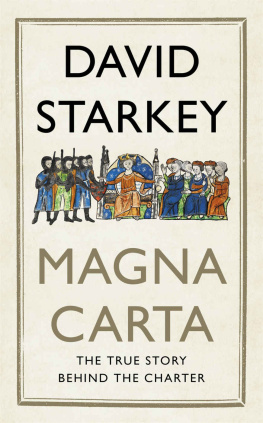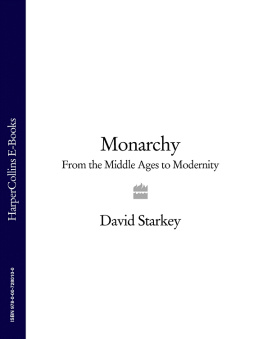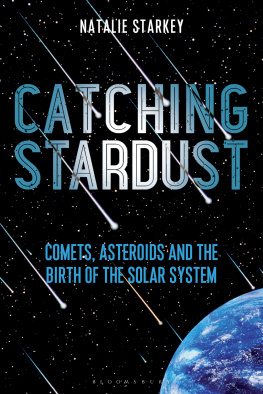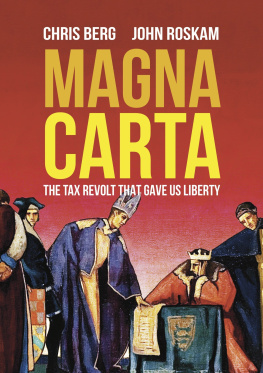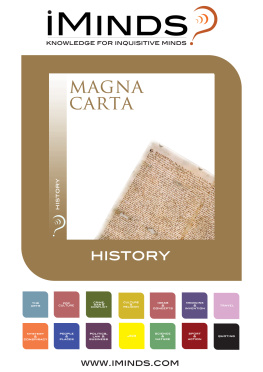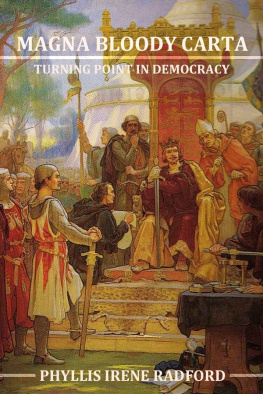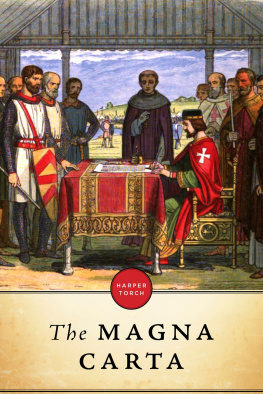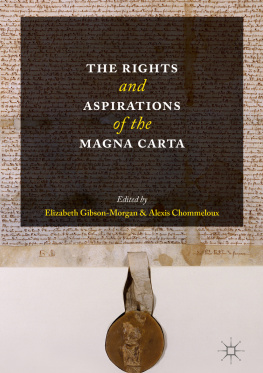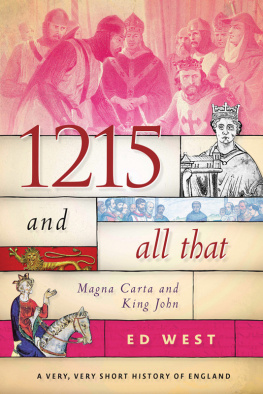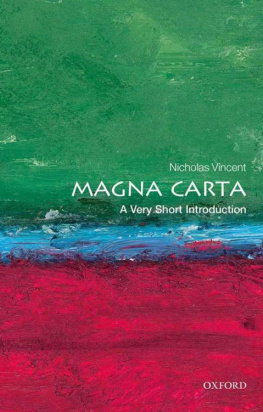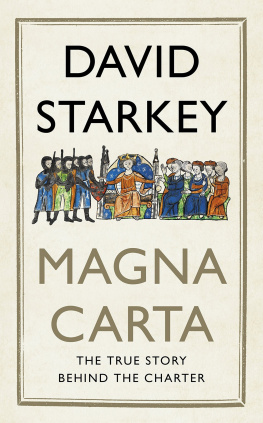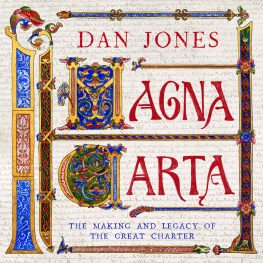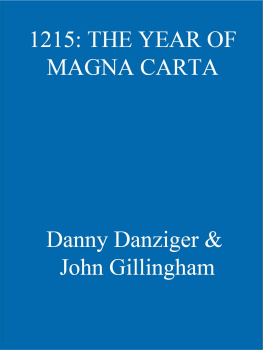Also by David Starkey
The Reign of Henry VIII: Personalities and Politics
Elizabeth: Apprenticeship
Six Wives: the Queens of Henry VIII
The Monarchy of England: The Beginnings
Monarchy: From the Middle Ages to Modernity
Henry: Virtuous Prince
Crown and Country: A History of England through the Monarchy
Music and Monarchy
About the Author
David Starkey is an Honorary Fellow of Fitzwilliam College, Cambridge, and the author of Elizabeth, Six Wives: The Queens of Henry VIII and Henry: Virtuous Prince. He is a winner of the Norton Medlicott Medal for Services to History, and of the WH Smith Prize. He is well-known for his historical television series focusing on the Tudors, monarchy and Britain, and for his radio appearances. Starkey was made a CBE in 2007 and lives in London.
MAGNA CARTA
The True Story Behind the Charter
David Starkey

www.hodder.co.uk
First published in Great Britain in 2015 by
Hodder & Stoughton
An Hachette UK company
Copyright David Starkey 2015
The right of David Starkey to be identified as the Author of the Work has been asserted by him in accordance with the Copyright, Designs and Patents Act 1988.
All rights reserved.
No part of this publication may be reproduced, stored in a retrieval system, or transmitted, in any form or by any means without the prior written permission of the publisher, nor be otherwise circulated in any form of binding or cover other than that in which it is published and without a similar condition being imposed on the subsequent purchaser.
A CIP catalogue record for this title is available from the British Library
ISBN 9781473610064
Hodder & Stoughton Ltd
Carmelite House
50 Victoria Embankment
London EC4Y 0DZ
www.hodder.co.uk
In piam memoriam
G. R. E
CONTENTS
INTRODUCTION
J ust over a hundred years ago the preparations for the 700th anniversary of Magna Carta were well underway. The lead was taken by the Royal Historical Society. With a confidence which belied the fact that the Society was itself less than forty years old, it determined that the celebrations should be directed by competent persons. An international committee of the great and good was set up, with the historian and Liberal politician, Viscount Bryce, in the chair and the Archbishop of Canterbury and the Lord Mayor of London prominent among its members as representing the continuity of English life from 12151915. A visit to Runnymede and an address upon the spot were contemplated and learned essays commissioned.
Then, with only ten months to go to the anniversary, Great Britain entered the First World War on 4 August 1914 and everything was abandoned as:
the memory of the assertion of the principle of government by law was overclouded by the cares of the immense struggle to maintain that principle through force of arms.
No such catastrophe has intervened to mar the celebrations of the 800th anniversary. Indeed, as I write this in the early weeks of 2015, it is clear that they will be on a scale that makes the projected events of 1915 look very small beer. They began a year early, when the prime minister held a one year to go party at Downing Street on the 799th anniversary. In the year itself the British Library is mounting its largest ever exhibition. All four surviving copies of the 1215 Charter are being reunited, first in the British Library and then in the neo-gothic splendours of the Royal Gallery in the Palace of Westminster. The Declaration of Independence and the Bill of Rights are being brought over from Washington to pay tribute to their ancestral Charter here. The Queen will step into Johns shoes at Runnymede on 15 June. There are displays and debates and pageants and re-enactments in The Temple and Lincoln and Salisbury and anywhere that can claim a connexion. There is a whole season of programmes on the BBC called Taking Liberties, of which I am presenting one. And there are books like this.
My television programme, rather presumptuously entitled (not by me) David Starkeys Magna Carta, looks at the Charter in an eight-hundred-year sweep, from the thirteenth century to the present day. This book draws on the work that I did for the television programme. But its scope and intention are different. Instead of a birds-eye view of eight centuries, it focuses on the ten years 1215 to 1225. This was the decade in which the Charter transmuted from an extremist tract into the bedrock of an evolving English constitution. The case for this view of Magna Carta is argued in detail in the text of the book; it is also presented in tabular form in the Appendix: The Charters, which prints the three crucial versions of the Charter 1215, 1216 and 1225 in parallel columns, and numbers and matches the chapters (or clauses).
This enables the reader to see at a glance both what stayed the same and what changed across the decade. The conclusion is inescapable: the Charter that is known to history is a product, not of the revolution coup of 1215, but of the conservative fight-back of 1216 and the consciously centrist compromise and bargain of 1225.
The story, with its remarkable cast of characters, its turbulent events and sudden reversals of fortune not least of the Charter itself is a fascinating one. It is also unusually well documented. Indeed, it is perhaps the first event in English history in which we can see the political process fully at work.
And that is how I try to tell it, as it happened day by day rather than with an eye to the future. Told like this, it is an antidote to some of the triumphalism of the anniversary celebrations. But my aim is not to debunk but to see if the real story of Magna Carta offers some help and guidance in our present discontents.
For, though you would not know it from the official celebrations, all is not well with the legacy of Magna Carta. There is no overt external military threat, as in 1915. But now in 2015 there are deeper and more insidious problems. Our constitution is indeed 800 years old. And that it is is a fine and remarkable thing. But it is also showing its age and creaking at the joints. Some would even say it is suffering from terminal osteoporosis. Is it time to give up and start again? Or does looking back at where it all began in Magna Carta offer a better way?
Read and see.
The Red House
Kent
February 2015
ONE
THE GREAT KING?
JOHN AND HIS OPPONENTS

Seal of Philip Augustus
I n 1212, John, King of England, Lord of Ireland and Duke of Aquitaine, seemed about to match, if not to exceed, the deeds of his greatest ancestors. There was no one in Ireland, Scotland and Wales, an unusually well-informed contemporary wrote, who did not obey his nod something which, as is well-known, none of his predecessors had achieved.
It was an astonishing turnaround.
John, born in 1167, was the runt of a litter of eight children: five sons and three daughters. From his father Henry II, he stood to inherit England, Normandy, Anjou, Maine and Touraine and from his mother Eleanor, Aquitaine. The resulting block of territories, known to historians as the Angevin Empire, stretched from Scotland to the Pyrenees; was the largest landmass in Europe subject to a single ruler, and dwarfed the kingdom of France, its nominal overlord.
John, nicknamed Lackland as the portionless youngest son, had been prepared to do anything to get his hands on this inheritance. He had betrayed his father on his deathbed and his brother Richard in his hour of greatest need. He became king in 1199 in a disputed succession and murdered, some said with his own hand, his nephew and rival for the throne, Arthur of Brittany.

